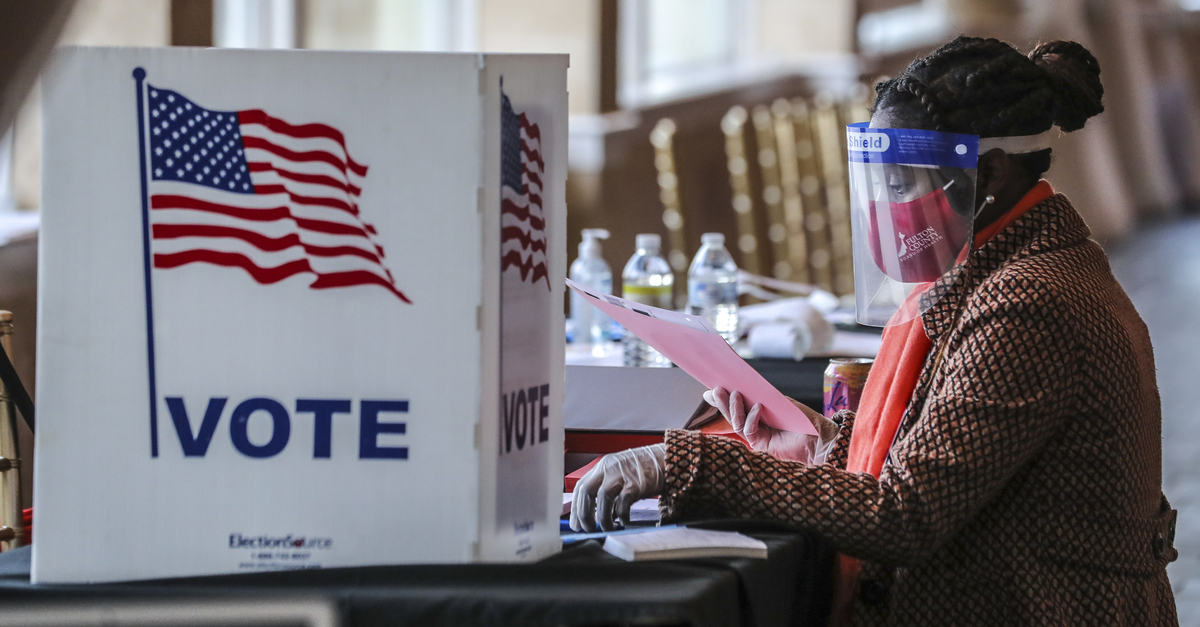
FILE – A poll worker sorts through voting material at Park Tavern in Atlanta, Tuesday, Nov. 3, 2020 (John Spink/Atlanta Journal-Constitution via AP, File).
A coalition of voting rights groups this week filed a federal lawsuit aiming to extend a voting registration deadline in Georgia due to the “tremendous destruction” caused by Hurricane Helene.
In turn, the Republican National Committee and Georgia Republican Party moved to intervene as defendants in the case — presumably to keep the current deadlines in the Peach State just the way they are.
Filed Monday night by the NAACP and others, the federal complaint alleges the “historic” storm system “likely prevented tens of thousands of Georgia residents from timely registering to vote because they lacked internet access, could not travel, lacked access to postal services, or had no operational county election office.”
The registration deadline was Oct. 7. The lawsuit, which names Gov. Brian Kemp and Secretary of State Brad Raffensperger, both Republicans, as defendants, seeks a one-week extension of the deadline — to Oct. 14.
The plaintiffs say their emergency action intends to “prevent widespread disenfranchisement of would-be eligible voters who were hindered from registering to vote by Georgia’s October 7 deadline due to a catastrophic weather event beyond their control.”
Hurricane Helene, the lawsuit notes, is second-most deadly hurricane in continental U.S. history. So far, over 200 people are confirmed dead and over 600 are missing. The present loss of life from the storms is only surpassed by the 1,392 deaths caused by Hurricane Katrina.
The devastation wrought came at an exceedingly inopportune time in terms of voter registration patterns, the lawsuit says.
“Hurricane Helene significantly impaired registration throughout the entire week leading up to the deadline, which is historically a popular time to register,” the complaint continues. “Data from Georgia’s voter files shows that Georgia historically sees a spike in registrations in the last week of registration compared to the prior week.”
During the last presidential election year, some 57,000 people registered to vote during the final week before the deadline, according to the lawsuit. Such numbers equate to an over 56% increase from the week prior. And, the plaintiffs say, such trends were present in 2022, 2018, and 2016 — presidential and midterm election years.
The implication is clear but the complaint goes on to explicitly make the case that the week in question was likely to have garnered a significant number of new voter sign-ups.
“This data suggests that the week in which Hurricane Helene most impacted the state is the same week in which tens of thousands of eligible Georgians would have registered to vote,” the lawsuit reads.
The complaint takes Kemp and Raffensperger to task for having “failed to extend the voter registration deadline, risking disenfranchising eligible voters across Georgia who would have registered absent the impacts of the storm.”
But the voting problems are not just the physical issues caused by Hurricane Helene, according to the plaintiffs.
“Defendant Secretary of State is aware that the Secretary of State’s online voter registration platform has been inaccessible and/or experiencing persistent glitches today,” the plaintiffs wrote in an accompanying memo on Monday. “Undersigned counsel have also received multiple reports of voters experiencing difficulty using the Secretary of State’s online voter registration platform today.”
The plaintiffs say the Oct. 7 deadline “violates the First and Fourteenth Amendments to the Constitution in light of the circumstances caused by Hurricane Helene” because the right to vote “cannot be abridged without adequate justification.”
The memo goes on to argue Kemp and Raffensperger have “no legitimate state interest” that outweighs the burden to protect voting rights.
The plaintiffs also say that not extending the deadline would “disproportionately” disenfranchise “large populations of Black voters.”
The complaint makes the case for the racial impact of Hurricane Helene by citing state-collected demographic data:
A significant number of prospective minority voters were affected by the loss of voter registration opportunities due to Hurricane Helene. According to the Georgia Election Hub Database, several counties with significant Black populations were impacted, including Burke (46% of the county’s 24,438 residents are Black), Chatham (40.9% of the county’s 303,655 residents are Black); Lincoln (26.1% of the county’s 7,879 residents are Black); Lowndes (38% of the county’s 120,712 residents are Black); McDuffie (40.9% of the county’s 21,799 residents are Black); Richmond (59% of the county’s 205,414 residents are Black); and Washington (54.1% of the county’s 19,820 residents are Black).
Because of Helene, the coalition plaintiffs say, they were “forced to cancel several door-to-door canvassing voter registration shifts” in at least four of the above-mentioned counties. And in one such county, the lawsuit says, one of the plaintiffs “did not report a single voter registering to vote with the support of” a voter registration volunteer.
In their motion to intervene, the RNC and Georgia GOP say they are well situated to be turned into defendants because “when the Georgia NAACP has” previously “challenged Georgia’s election laws” in the same court, they “have successfully intervened.”
“Given the complicated issues and quick timeline, Movants’ experience in election litigation will aid the Court in reaching a reasoned decision on the motion,” the Republican intervenors say. “Movants reached out to the parties for their position on the motion, but have not heard back as of the time of filing.”
A hearing on the request for a temporary restraining order is slated for 3:45 p.m. on Wednesday afternoon.
Have a tip we should know? [email protected]






